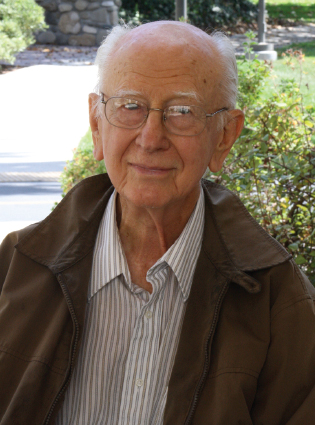Profile of Distinction: George Matthaei

An Interview with Professor Emeritus, George Matthaei
Interviewed for the Fall 2011 ECE Current newsletter
- UCSB Years: 1964 to 1991
- Ph.D.: Stanford University, Electrical Engineering
- Research Areas: crosstalk and wave effects in digital circuits, and microwave and millimeterwave passive and active circuits
- Honors: IEEE MTT Group "Microwave Prize" (1961), IEEE Centennial Medal (1984), IEEE Microwave Theory and Techniques Society "Microwave Career Award" (1996)
 Video of Interview with George Matthaei
Video of Interview with George Matthaei
Professor Emeritus George Matthaei came to UCSB in 1964 when the department had just been formed. Matthaei is an IEEE Fellow and member of Sigma Xi and Tau Beta Pi. He worked for the ECE department for 27 years until he retired in 1991. He reflects on his career and the evolution of the department.
What originally made you interested in the electrical engineering field?
I knew I wanted to be an engineer from a very early age. I used to build model airplanes and was active in competitions involving design, flying, and craftsmanship of models. But I went to the University of Washington, which had a very good Aeronautical Engineering program, but after a year and two thirds, I went into the army and got into radar. And that finally switched me over to Electrical Engineering.
What are one or two of the biggest changes you have seen over the years in the ECE Department?
One thing that people may not have realized is that at that time, there was no college of engineering. There was a school of engineering, under the thumb of College of Letters and Sciences. When the accreditation people came they told the Chancellor that unless the School of Engineering got out from under the thumb of College of Letters and Sciences, they wouldn't give any accreditation. And so we got it: the College of Engineering. It loosened things up so we could have a competitive curriculum. That was pretty important.
What classes have been your favorite and why?
I think I liked to teach Electromagnetic Theory best, especially things having to do with microwave engineering. I like the aspect that you could add to the mathematics with graphical drawings and things like that. I used to take some of the kids on field trips.
Given your successful career as an engineering professor, would you recommend students to become professors?
Not necessarily. If they like to explain things, then yes, but if they don’t particularly like to explain and get impatient, then I would say no – do something else. If a student at the Master’s level thinks they might be interested in teaching, it’s good for them to have a teaching assistantship and get some experience dealing with students. However, if they're in the PhD level, I think it is in the best interest for the student to get a research assistantship because very often this leads to the research project for the student’s dissertation. So if they have a research opportunity, that’s the way to go.
What is your advice for students starting their engineering careers this fall as new freshman and as first-year students in MS or PHD programs?
As I got into graduate work, I learned a lot about how to study. One thing that I would certainly advise – I didn't get to really doing this myself until graduate school – take lots of notes and leave lots of space for adding comments, and after class in the evening while you go over it try to explain it to yourself. And add notes if you figure out what the fundamentals were, so you have useful notes. I think that’s quite important in many classes perhaps in engineering and physics more so than some. What you learn in the beginning, the rest builds on top of it and if you don’t learn the first part then you're handicapped for learning the rest. So it really pays to keep up with it. I learned with exams to go through the material and make an outline of the high points. It made good study material for the second exam.
What do you consider your own greatest achievement in research?
I did a lot of research on microwave components, particularly microwave filters, which are used in communication for separating out signals and that sort of thing. And there is one kind that I worked on called the interdigital filter, and that became used fairly widely afterwards. I think that was a quite useful contribution.
If you could ask alumni to do one thing for UCSB College of Engineering and the Electrical and Engineer department, what would you ask them to do?
I think the main thing is to contribute. And with regard to time, there are unique situations where some can help a lot with their special expertise.